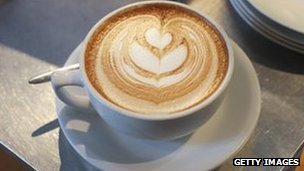Study Shows Coffee Can Help Prevent Depression, Empty Coffee Cups
 If you need a study to tell you that coffee may prevent depression, you probably don’t drink coffee. If you did, you would know that its magical, motivational properties can compel you to accomplish tasks with reckless abandon in a delightful, suddenly-I-don’t-hate-being-alive-this-morning sort of way. Well, a study of 50,000 female nurses published in the Archives of Internal Medicine shows that coffee (but only the real, caffeinated stuff) reduces the occurrence of depression, in women at least. Doctors, being doctors, are suggesting more study rather than suggesting that women start drinking more coffee. Ladies, allow me to suggest that you start drinking more coffee.
If you need a study to tell you that coffee may prevent depression, you probably don’t drink coffee. If you did, you would know that its magical, motivational properties can compel you to accomplish tasks with reckless abandon in a delightful, suddenly-I-don’t-hate-being-alive-this-morning sort of way. Well, a study of 50,000 female nurses published in the Archives of Internal Medicine shows that coffee (but only the real, caffeinated stuff) reduces the occurrence of depression, in women at least. Doctors, being doctors, are suggesting more study rather than suggesting that women start drinking more coffee. Ladies, allow me to suggest that you start drinking more coffee.
The study, orchestrated by doubtlessly caffeinated folks from The Harvard Medical School, tracked the involved nurses for an entire decade, relying on self-reporting to record their coffee consumption. The results were that out of the 2,600 who developed varying degrees of depression, coffee drinking was not popular. In comparison to the non-drinkers who had one cup or less per week, women who drank two to three cups a day where 15% less likely to become depressed; the guzzlers who drank four or more were 20% less likely, assuming no one tried to pry them off the coffee maker.
Of course, the study is not that cut and dried. This is life, so there are plenty of complicating variables involved. Coffee drinking in the women studied also correlated with smoking, drinking (alcohol), and decreased involvement in church, community, and volunteer groups — and these are the ones who typically aren’t depressed. They were also less likely to have diabetes, high blood pressure, or to be overweight. Still, with all this controlled for, the inversely proportional relationship between coffee and depression continued.
The thought is that while coffee is the real subject here, that the caffeine is what makes the difference. Caffeine appears to block a chemical receptor adenosine which may be the reason for the correlation. But as always, more research is needed to really cement the connection. Also, we have to keep everybody’s favorite logical fallacy — post hoc ergo propter hoc — in mind. The researchers point out that depression can also come part and parcel with disrupted sleep patterns and anxiety, and if you have trouble sleeping and are anxious, the last thing you’ll want to do is start drinking four cups of coffee a day.
Whatever the case, I have participated in a four-year caffeine related study called college and I can report that coffee is amazing and does amazing things amazingly. The trick is to drink it until it works and then to continue drinking it until it stops working, then afterwards, to have a cup of coffee. Lather, rinse, repeat. Now if you’ll excuse me, I just got to the “repeat” step.
(via BBC)
Have a tip we should know? [email protected]